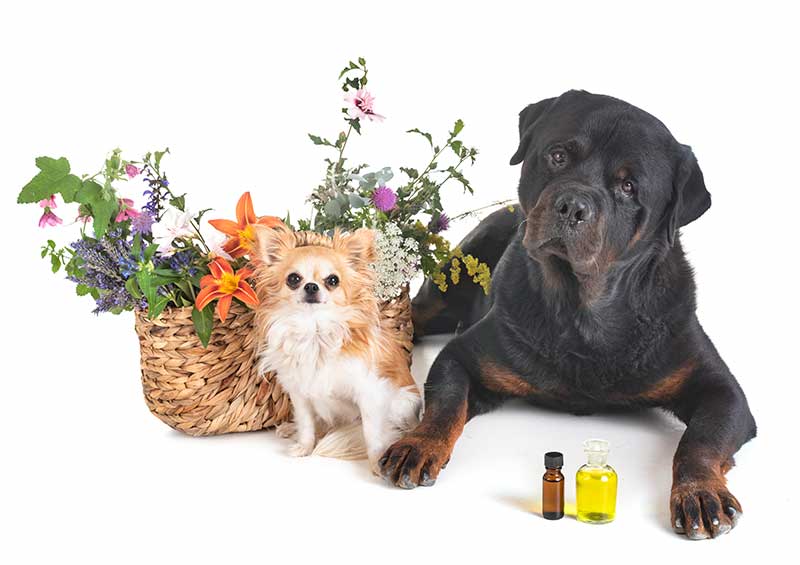Essential Oils and Pets

Essential oils have recently gained popularity in aromatherapy, with people using them as home remedies for common ailments such as nasal congestion, anxiety, sore muscles, and skin conditions. Plant oils and scents are also included in many different products for use around the home, such as cleaners, shampoo, and even toothpaste. So it begs the question – are essential oils and pets a safe combination?
Essential Oils Basics
What exactly are essential oils? Simply put, they are plant compounds that have been carefully extracted and distilled, leaving microscopic droplets that can impart the properties of the plant itself.
Essential oils are described as highly volatile, meaning they can powerfully affect our minds and bodies. They enter the body through contact with the skin, or through inhalation or ingestion. Because they are absorbed into the bloodstream, essential oils can affect the organs rapidly. Used properly, they can have therapeutic effects.
It’s important to know that essential oils can also be toxic to our pets, without an understanding of how to use them correctly. Since the compounds they contain are biologically active, they can cause a myriad of dangerous side effects and even organ damage if used improperly.
Essential Oils and Pets
Essential oils can be beneficial to our pets in some circumstances, but they must be used judiciously. Always consult an integrative medicine veterinarian to learn the best approaches to use them, as some of them have been shown to cause specific problems in pets.
Cats in particular are sensitive to oils, as they lack a metabolic liver enzyme that prevents them from clearing the oils from their system, which can lead to liver toxicity.
Every pet reacts differently to essential oils, so it’s important to observe them closely for signs of any problems. Things to look for and indicate discontinuing use of essential oils would be:
- Panting/ increased breathing rate
- Salivating/ drooling
- Change in breathing pattern
- Squinting eyes
- Any behavior out of the ordinary
General Safety Tips
Lavender is an example of an oil that is generally safe to use around pets, and can be calming and reduce anxiety. Other oils that can be safe to use include rosemary, lemon, and sandalwood. If you have specific questions about certain oils you are using or would like to use, please call us to learn more.
Here are some basic safety tips for use of essential oils in the home:
- Keep oils stored out of pet’s reach
- Never use 100% concentration; always dilute essential oils with a carrier oil
- Birds have very sensitive respiratory tracts, and essential oil use is not recommended around them
- If you have a pet with respiratory illness or asthma, don’t diffuse essential oils in your home
- If your pet ingests oils, call the ASPCA Pet Poison Control hotline and your veterinarian immediately
A Word On Diffusers
If you use a diffuser, remember that your pet is more sensitive than you are to smells. Give her a way to leave the room where the diffusing is happening.
Always use small amounts of essential oils, whichever the method of application. The gentlest and most ideal way to introduce essential oils to pets is in a water based ultrasonic diffuser in a well ventilated room. If any problems occur, stop diffusing and move your pet to fresh air.
We hope these safety tips have given you some helpful guidelines about essential oils and pets. Essential oil use can be helpful in pets but judicious use and guidance from a veterinarian are needed to maintain pet safety. If you have specific questions, please don’t hesitate to call us. The Whole Pet Vet Hospital and Wellness Center is here for your and your pets.
